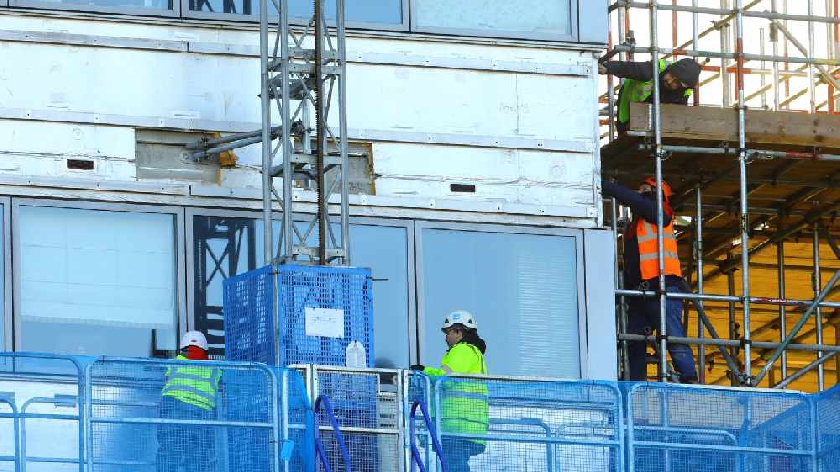
A local MP has responded to questions raised by anguished property leaseholders that are 'trapped' in flats that they cannot sell.
There are hundreds of residents living in high-rise buildings in Milton Keynes that are deemed unsafe due to the cladding that has been used.
Since the Grenfell Fire tragedy in 2017, the dangers surrounding inflammable cladding on residential tower blocks have been highlighted and fire safety standards have been tightened.
Remedy work has begun on properties across the country to make them safe, but this has led to a debate about who should pay for the work.
Leaseholders have been faced with large bills and have been unable to sell their properties, meaning that some even fear bankruptcy.
MKFM was contacted by a Central Milton Keynes resident, Adam, who currently cannot sell his flat due to the cladding issues. He is also set to face a hefty bill for remediation works and claims that for the second year running, the service charge has increased by 60% due to insurance costs.
Adam says he has been "slowly" emailing Ben Everitt, MP for Milton Keynes North, about the issue since October 2020.
The leaseholder believes that the Government has done "nothing" to protect people like him from "astronomical" bills for safety issues that aren't their fault.
Adam contacted MKFM with several questions relating to the cladding scandal, and Ben Everitt MP has responded to them as follows:
Leaseholder: How many MK buildings and people are affected by new fire safety regulations?
Ben: If this related to how many buildings may need remediation work relating to cladding or fire safety more generally, I am unaware of any source that provides a local breakdown. The Government does publish monthly data on ACM remediation work which includes progress on this by Local Authority.
The data also shows that, as of 31 May 2021, all buildings with ACM cladding systems in Milton Keynes have started or completed remediation work. Five buildings in Milton Keynes were registered to this Fund as of 31 May 2021.
Leaseholder: Why is only £300m of the £5bn promised allocated?
Ben: As of 31 May 2021, £600 million has been provided in funding for ACM remediation projects (£400 million of this for the remediation of social sector residential buildings and £200 million for private sector residential buildings).
According to the latest MHCLG data release, as of 31 May 2021, a total of £428 million has been allocated for the remediation of non-ACM cladding through the Building Safety Fund.
The latest data release from MHCLG shows that, at the end of May 2021, 93 per cent of all identified high-rise residential and publicly owned buildings in England had either completed or started remediation work to remove and replace unsafe cladding. This accounts for 436 buildings. 79 per cent of all identified buildings – 371 buildings – no longer have ACM cladding systems, with 260 buildings having fully completed remediation. Of the 7 per cent of buildings yet to start remediation work – which accounts for 33 buildings – 9 are vacant.
Leaseholder: Why is 20% VAT being charged?
Ben: The Treasury stated in May:
“Under the current VAT rules, replacement cladding may qualify for a zero rate when the replacement cladding forms part of the original construction and the person requesting the replacement cladding is either the owner, developer or contractor during the original construction works. Otherwise, remediation work falls under repair and maintenance and attracts the standard rate of VAT.
“The Government announced on 10 February 2021 that it would fully fund the cost of replacing unsafe cladding for all leaseholders in residential buildings 18 metres and over in England. It was also announced that for low rise buildings between 11 metres and 18 metres, with a lower risk to safety, there will be new protection from the costs of cladding removal.”
Leaseholder: 11-18m buildings being told there could be loans but being sent £10k bills already. How is this fair?
Ben: The Housing Minister recently gave an update stating:
“We are working to develop the underpinning details of the finance scheme to ensure that it protects leaseholders, prioritises affordability and accelerates remediation. Further details on the finance scheme will be made available as soon as we are in a position to do so.”
It is worth noting that, as I have already pointed out to Adam in previous correspondence, as a Member of the Housing, Communities and Local Government Committee, I have already contributed and co-signed a Report which argues for more adequate support for leaseholders, and provides recommendations to the government to address ongoing issues that residents like Adam face. With the Committee, I shall continue to work with fellow MPs and Ministers to push for a fairer deal for those facing remediation costs.















